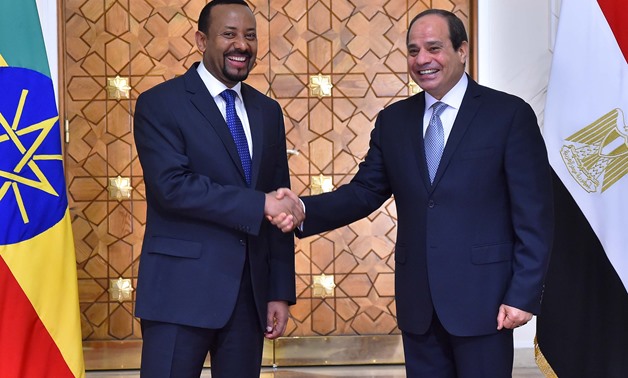
Egyptian President Abdel Fatah al-Sisi shakes hands with Ethiopian Prime Minister Abiy Ahmed – press photo
CAIRO - 10 June 2018: Ethiopian Prime Minister, Abiy Ahmed, swore to God that his country will not cause any harm to Egypt's Nile water share, referring to the Egyptian concerns over the negative impacts of the Grand Ethiopian Renaissance Dam (GERD).
In his word during a joint press conference with President Abdel Fatah al-Sisi at Ittihadia palace, Ahmed stated, “We have no intention to cause any harm to Egypt and its people. We want to benefit from the Nile River without affecting the interest of Egyptians. We want to rebuild confidence between our nations.”
The Ethiopian prime minister arrived in Cairo on Sunday on a two-day visit. During the conference, he expressed his happiness for visiting Egypt and meeting President Sisi where they discussed boosting bilateral relations as well as issues of mutual concern.
For his part, President Sisi said that “both countries went a long way in re-building confidence and we will exert more efforts in facing common challenges, notably concluding an agreement in regard with the GERD that ensures the Nile water shares of both countries.”
Ahmed added “The African neighboring nations used to conspire against each other in the past, but this led to nothing. Actually, we can now overcome our problems through cooperation among ourselves.”
“I came today to prove my country’s well intention not only to preserve Egypt’s Nile water share but also to increase it,” Ahmed said.
At the end of his word, Ahmed asserted that his “government and people .. want to cooperate with the people of Egypt in any area, not only [the] Nile but other areas as well.”
Egypt fears the GERD project will reduce its share from the water that run to its fields from the Nile reservoirs in Ethiopia’s highlands.
Egypt depends entirely on Nile water for drinking and irrigation purposes, reiterating consistently its "historical right" to the river guaranteed in the 1929 and 1959 Nile agreements, which granted the country 87 percent of Nile water and the right to veto or approve irrigation projects in the upstream countries.
Egypt’s average water per-capita is expected to drop from 663 cubic meters per year to 582 cubic meters by 2025, according to the Central Agency for Public Mobilization and Statistics (CAPMAS). Addis Ababa, however, claimed that the dam is necessary for Ethiopia’s development and will not harm downstream countries.
In 2011, Ethiopia started the construction of the 6,000-megawatt Renaissance Dam over the Blue Nile River, one of the major sources of water that forms the Nile River downstream. Concerns have risen in Cairo and Khartoum over the negative impact the Ethiopian dam will have on their historic Nile water share, amounting to 55.5 billion cubic meters in Egypt only, in accordance with the historic 1959 agreement with Sudan.
.JPG)
Egyptian President Abdel Fatah al-Sisi meets with Ethiopian Prime Minister Abiy Ahmed – press photo
Future economic cooperation
In his word, Sisi said that the Sunday meeting discussed increasing trade exchange between Egypt and Ethiopia, in line with the Egyptian private sector’s interested in injecting new investments in the Ethiopian market.
Sisi and Ahmed agreed to facilitate investment measures in both sides to support businessmen from both countries. They also agreed to establish an Egyptian industrial zone in Ethiopia while Egypt will encourage importing Ethiopian livestock, besides increasing cooperation in other fields, such as fisheries.
“We aim to present a successful model of economic integration between African nations,” Sisi added.
He asserted that Egypt will take serious steps to activate its previous agreement with Ethiopia and Sudan to launch a tripartite infrastructure fund during the coming ministerial meeting between the three countries scheduled on July 3 and 4.
On the other hand, both leaders reviewed the regional developments, especially in South Sudan, Somalia, and relations between Ethiopia and Eretria.
Finally, Sisi stressed that “Egypt has a strategic approach to deepen its ties with Ethiopia in all fields, sparing no effort to achieve this goal.”

Comments
Leave a Comment